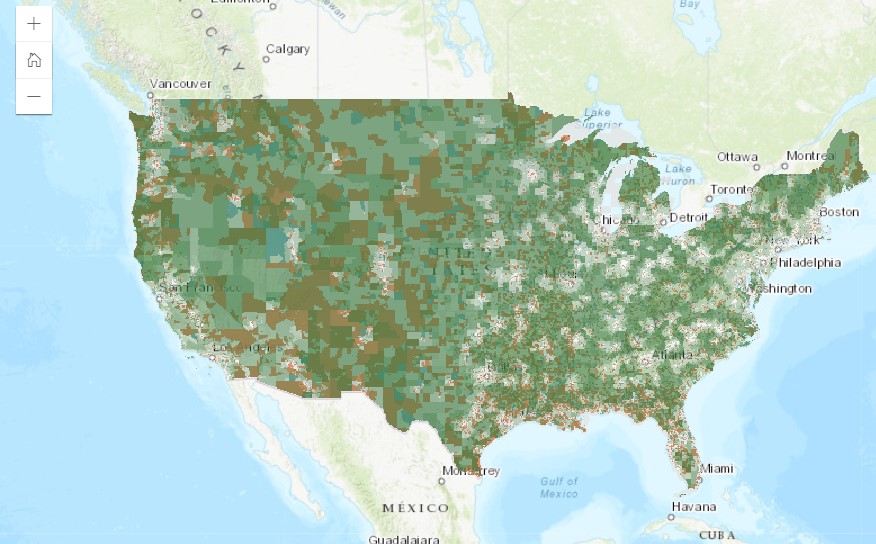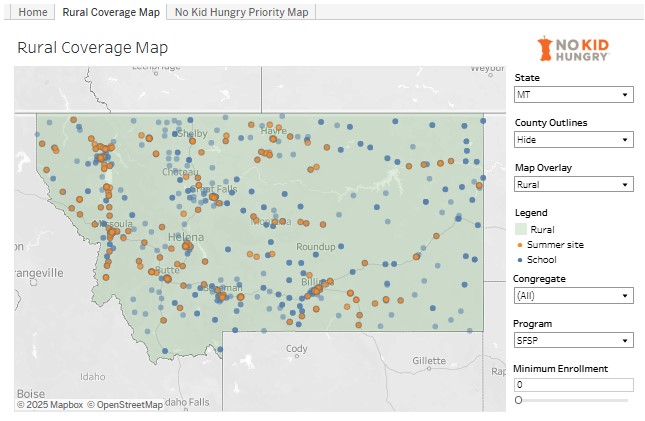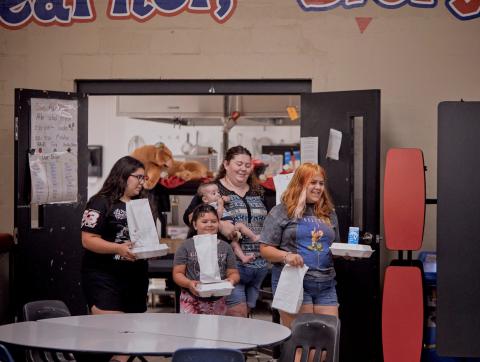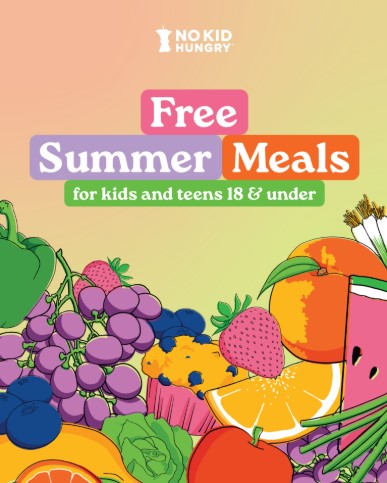Non-Congregate Summer Meals
New legislation opens the door to connecting more rural children with the food they need to learn and grow.
The Consolidated Appropriations Act of 2023 permanently authorized a non-congregate summer meals option for rural communities without congregate service. This option became available in summer 2023 using temporary guidance, and as required by law, USDA issued an interim final rule in December 2023 laying out guidance for 2024 and beyond. Listed below are the top takeaways for program operators and highlight some key differences from 2023 guidance. Implementing non-congregate service is an exciting opportunity to expand the reach of summer meals and provide more children with much-needed nutrition during the summer months.
- Definition of "Rural": The "core" definition for 2024 is much more expansive than the previous regulatory definitions and 2023 guidance.
- Many of the national datasets used by states to help identify "rural pockets" in 2023 have now been incorporated into the "core" definition.
- See the updated USDA rural designation map and No Kid Hungry's Summer Eligibility Map for a visualization of the new "core" definition.
- States may still consider approving additional "rural pockets" beyond these areas as needed but will need approval from the relevant USDA FNS regional office.
- "No Congregate Service": The IFR does not offer many parameters beyond the 2023 guidance, leaving discretion to states to determine where children do not have access to congregate service, allowing non-congregate service. However, what is noted:
- Non-congregate service may complement limited congregate service: A non-congregate breakfast may be provided to take home following a congregate lunch if the site does not provide a congregate breakfast, or non-congregate meals may be provided for the weekend if a site only provides congregate meals on weekdays.
- Non-congregate service is permitted at a congregate site if it can be demonstrated to the satisfaction of the state agency that is serves a different group of children than the congregate service.
- Non-congregate and congregate service may not occur at the same time at the same site, even if different meals are being provided.
- Meal Service Options: Unlike summer 2023, states may not issue blanket statewide restrictions or bans on service options allowable under federal guidance. All states must follow the federal guidance as the default for sponsors in good standing but may limit or prohibit certain options on a case-by-case basis depending on sponsor/site capacity.
- Multi-day meal distribution: Sites may distribute unitized meals for up to ten calendar days at one time (e.g., ten breakfasts and ten lunches every ten days or every two weeks).
- Bulk meal distribution: For meals composed of bulk items (i.e., loaves of bread, packs of deli meat, bags of salad greens), sites may distribute meals for up to five calendar days at one time (e.g., five breakfasts and five lunches every five days or every week), but states have discretion to approve distribution of meals for up to 10 days at a time, such as in remote areas where weekly delivery is not possible.
- Parent/guardian pick-up: Meals may be distributed to a parent/guardian without the child present as long as the sponsor/site has a system to document, to a reasonable extent, that the adult has an eligible child and no duplicate meals are provided.
- The guardian does not need to be a legal guardian.
- Operators are not expected to request birth certificates or other legal proof of guardianship.
- Home Delivery: Home delivery was not included in the IFR as an option that states must allow with only case-by-case exceptions, but it is mentioned as a possible distribution method.
- Written consent from households is required prior to initiating home meal delivery.
- Non-profit sponsors may provide home delivery and do not need to do so through a Memorandum of Understanding (MOU) with the local school food authority.
- However, if the non-profit sponsor wishes to obtain school data to identify children, then an MOU must be in place.
- Conditional Sites: This is a new term for a site type that was permitted in 2023. At a conditional site, non-congregate service can occur in rural areas that do not meet the area eligibility threshold, but only meals served to eligible children can be claimed for reimbursement.
- To be eligible for reimbursement, children must individually meet the income eligibility guidelines as determined through application or school data.
- Meals may be served to children who do not meet the eligibility guidelines or do not have documentation on file by the end of the claim month, but the cost must be paid from non-program funds, or sites may charge for meals.
- Pre-approval and Site Visits:
- Sites that operated congregate service previously but are beginning non-congregate service must be considered new sites that require a pre-approval visit and a site visit within the first two weeks of operation.
- Sites that provided non-congregate service in 2023 are not considered new sites.
- Second Meals: Non-congregate sites may not claim reimbursement for second meals.
- This contrasts with the existing rule for congregate sites, which may claim reimbursement for serving a second meal to an eligible child up to 2 percent of eligible first meals, by type, per claiming period.
-
Congregate Meal Service: New. Food service at which meals are provided to children are consumed on site in a supervised setting.
-
Non-Congregate Meal Service: New. Food service at which meals are provided for children to consumer all components off-site. Must be operated at sites designated "rural" with no congregate meal service. (See updated definition for "rural" below.)
-
Rural: Updated. USDA updated and expanded its definition to incorporate the classification schemes used to identify rural pockets for 2023 and provide additional discretion to the Department. Rural includes any area:
- In a county not part of a Metropolitan Statistical Area (MSA) based on the Office of Management and Budget (OMB) definition; or
- Classified as non-metropolitan based on Rural-Urban Continuum Codes (RUCC) and Urban Influence Codes (UIC); or
- In a census tract classified as non-metropolitan based on Rural-Urban Commuting Area (RUCA) codes; or
- In an MSA that is not part of a Census Bureau-defined urban area (this includes area considered rural under the NCES Locale Classifications); or
- Not part of an urban area within the State, as determined by the Secretary, or
- Considered a "pocket" within an MSA which, at the option of the State agency and with relevant USDA Food and Nutrition Service Regional Office (FNSRO) approval, is determined to be rural in character based on other data sources.
- Note: USDA has released an updated FNS Rural Designation Map to reflect the new, comprehensive framework. No Kid Hungry's Summer Eligibility Map has also been updated to reflect the new definition.
-
Site: Updated. "The place where a child receives a Program meal." including "the indoor or outdoor location where congregate meals are served, a stop on a delivery route of a mobile congregate meal service, or the distribution location or route for a non-congregate meal service." For home delivery, a child's residence is not considered a non-congregate meal site for Program monitoring purposes.
-
New Site: Updated. Clarifies that experience sites operating a non-congregate meal service for the first time are considered new for Program purposes.
-
-
Conditional Non-Congregate Site: New definition. Site which qualifies for Program participation because it conducts non-congregate meal service for children eligible for free or reduced-price meals in an area that does not meet the definition of "areas in which poor economic conditions exists" and is not a camp.
-
Site Supervisor: Updated definition. "The individual who has been trained by the sponsor and is responsible for all administrative and management activities at the site, including, but not limited to maintaining documentation of meal deliveries, ensuring that all meals served are safe, and maintaining accurate point of service meal counts. Except for non-congregate meal service sites using delivery services, the individual is on site for the duration of the food service."
-
Operating Costs: Updated definition. Clarifies that costs to deliver non-congregate meals in rural areas under the Program are an allowable cost.
-
Good Standing: New definition. "The status of a program operator that meets its Program responsibilities, is current with its financial obligations, and, if applicable, has fully implemented all corrective actions within the required period of time."

Summer Meals Eligibility Map

Rural Summer Meal Coverage Tool
Rural Non-Congregate Summer Meal Programs: Understanding the Caregiver Experience
As meal providers begin operating rural non-congregate summer meal service, we want to be able to understand and share models, messaging, and approaches that work best for families participating in the program. With that in mind, No Kid Hungry conducted site observations at three different sites in summer 2023, each of which operated a different non-congregate model (grab-and-go, mobile meals, and delivery).
Interviews with caregivers surfaced many recommendations for participant-centered summer non-congregate meal programs. In addition to the video, the attached report also summarizes findings and recommendations.
In the video below, you can hear from Angela McKee Brown who conducted this research in summer 2023 and who presented findings at No Kid Hungry's 2024 Summer Nutrition Summit.
2023 Summer Meals Survey of Rural Families
Although non-congregate meal service is now a permanent option for rural areas with no access to congregate meal service in the Summer Food Service Program and National School Lunch Program's Seamless Summer Option, limited guidance existed at the time about how "access to congregate meal service" should be determined. In June 2023, No Kid Hungry partnered with FM3 Research to survey 600 rural families eligible for free or reduced price school meals about their experiences during the summer as well as their experiences with and preferences for summer meal service. A web-based survey was conducted and administered as telephone-based or online-based interviews. While features like location, transportation, and safety are important practical considerations, survey findings further elaborate the characteristics that families consider when determining whether a meal site is accessible to them. Findings from this survey describe aspects of rural families' preferences for program characteristics that influence their access to summer meal service.
Rural Non-Congregate Summer Meals in 2023: Insights from the First Year of a New Program
In rural communities, non-congregate meal programs like grab-and-go and direct home delivery can operate where congregate meals are not available in order to reach even more children during the summer months. The purpose of this study was to describe the implementation and elucidate lessons learned from this historic first year of the non-congregate summer meals option in rural areas in summer 2023. Through a combination of documented conversations and surveys with state agencies and sponsors, as well as Share Our Strength’s No Kid Hungry (NKH) staff who work directly with states, we have pieced together a comprehensive picture of what summer 2023 implementation of non-congregate meals looked like in terms of challenges, successes, and opportunities to expand and improve the program in summer 2024 and beyond.

Summer Meals Research
Learn more about successful models for rural non-congregate summer meals and hear some success stories from summer 2023-2024 in the resources below:
- Webinar: Rural Non-Congregate Summer Meals Webinar Series - This webinar series highlights successful rural non-congregate meal programs from summer 2023 and updated guidance on the Interim Final Rule from USDA for summer 2024. Watch the summer 2024 webinars below and on the webinar webpage.
- Implementation Guide: Successful Non-Congregate Meal Service Models for Rural Areas: Implementation Guide - This guide outlines effective models for non-congregate meal service. Use this guide to find strategies and tactics to execute a successful non-congregate summer meals program in your rural community. This guide has been updated for summer 2024.
- Fact Sheet: Making the Most of a Moment: Non-Congregate Meal Service in Rural Areas Fact Sheet - This resource gives an overview of the opportunity, provides important information about non-congregate meals, and outlines ways that you can support non-congregate meals in your state or region.
- Hiring Youth Workers:
- Benefits of Hiring Student Workers in Summer Non-Congregate Programs - This resource details how hiring youth workers can support summer non-congregate programs, from packing meals to surveying families to helping manage operations.
- The Summer Meals Student Workforce Toolkit - This resource is a comprehensive Guide for Recruiting, Training, and Managing Student Workers in Summer Meals Programs.
- Case Study: Feeding Burke County: A Behind the Scenes Look at Burke County School District's Non-Congregate Summer Food Service Program - This resource highlights Burke County School District’s Summer Food Service Program. It provides behind the scenes and meal box distribution details that can help you implement a similar program in your community.
- Case Study: Co-Creating Non-Congregate Summer Meals: Engaging Your Community to Design Your Program - This resource details how No Kid Hungry’s innovation team conducted a year-long human-centered design process to better understand how to effectively run summer non-congregate food programs that would meet the needs and desires of parents and caregivers, kids, and program operators. Learn about the outcomes from Innovation pilots on how 1) community-identified meal sites, 2) activities for kids, and 3) caregiver appreciation all help to improve summer non-congregate programs.
The contrast between large, urban-based organizations and smaller, rural schools and nonprofits can be significant. While their landscapes may differ, the common thread that unites schools and nonprofit organizations in both environments is the shared goal of ending childhood hunger. Establishing authentic connections between rural and urban organizations not only enriches their individual missions but also contributes to a more inclusive and collaborative nonprofit ecosystem. This resource will highlight practical strategies for building meaningful relationships that transcend the urban-rural divide, fostering a spirit of cooperation and mutual support.
In drive-thru or curbside pick-up models, the majority of families arrive by car to receive meals. Families drive up to the pick-up spot, and the meals are loaded into their cars outside. This model is best for meal programs planning to distribute multiple meals at one time. It also is ideal for communities with one or multiple easily accessible, central locations where meal distribution can take place. Multi-day meal packs result in a larger quantity of food leading to heavy boxes or bags, and a drive-thru or curbside model accommodates the large quantity of food.
Things to consider:
- Caregivers or families may stay in their vehicles while receiving meals. Some families may prefer this to remain more anonymous.
- Establish a distribution point that allows for a line of waiting vehicles without backing up onto the street.
- Think about weather conditions. Consider purchasing a tent and other inclement weather gear for your staff.
- Sites should use clear signage - in multiple languages, as applicable - to advertise the availability of free summer meals.
- Offer a separate line for families that walked to the site or used public transportation. Consider offering smaller bundles of meals or loaning grocery carts for the summer.

In this model, meals are available for pick-up at one of multiple central locations. Locations can be indoor or outdoor. Individual meals or multi-day meal packs are provided to children or caregivers, on behalf of their children, with this grab and go model. Walk-up distributions are ideal for communities with easily accessible central locations by public transportation, care, or walking. It is also ideal when fewer meals are provided at one time to accommodate those walking or taking public transportation.
Things to consider:
- If offering multi-day meal packs, consider offering smaller bundles or lending grocery carts to families walking or using public transportation.
- Remember to think about weather conditions. Consider purchasing a tent and other inclement weather gear for your staff. Or, provide your meal service indoors.
- If sites are indoors, be sure to clearly identify where people should go to receive the meals. Outdoor sites should also use clear signage to advertise the availability of free summer meals.

In mobile, non-congregate models, sponsors use a vehicle to travel to multiple site locations. Similar to congregate mobile models, non-congregate mobile routes are ideal in areas where families face transportation difficulties and in rural communities. Sponsors utilizing non-congregate mobile routes may be able to add more site locations to routes because vehicles do not need to wait for meals to be consumed.
Things to consider:
- This model works well for individual meals and multi-day meal packs.
- For schools, consider utilizing a known schedule for bus routes to identify stop locations and optimal routes.
- Select accessible locations near where families live, like parks, housing communities and apartment complexes.
- Apps and websites like Here Comes the Bus and Where's the Bus can be used by families to track where the bus or vehicle is along the meal service route. This prevents families from missing meal distributions if the vehicle is running early or late.

Direct home delivery works best as multi-day meal distributions. This saves sponsors the time and resources necessary for individual deliveries to families' homes.
Things to consider:
- Mail, delivery service, or hand delivery is allowed in this model.
- Home delivery requires signed consent from the parent or caregiver.
- Sponsors eligible for operating home delivery are school food authorities (SFAs) and community-based sponsors.
- Community-based sponsors must establish a Memorandum of Understanding (MOU) with an SFA in order to use the school's student data to identify and invite eligible students to home delivery.
- Sponsors must confirm the household's current contract information and identify the correct number of children in each household.
- All students within an area eligibility service area are eligible to receive home-delivered meals and may be invited to participate. If the service area includes non-area eligible locations, then the students must be determined eligible for free or reduced-price school meals in order to receive home delivered summer meals.
- With approval, meals for multiple days may be delivered at one time once the number of eligible children in the house has been verified and daily maximums are kept (i.e., no more than one breakfast and one lunch per child per day).

Getting the word out about your summer meals program is critical to its success, but sometimes promotion and outreach can feel daunting. No Kid Hungry has created a Summer Meals Outreach Toolkit that includes a range of ready-made and customizable promotional materials are available to help publicize summer meals in your community.

Summer Meals Outreach Toolkit
Meal service programs supporting rural communities must be creative about program promotion as they often cover large geographic areas with limited transportation and a lack of broadband infrastructure. These rural programs utilize multiple promotion strategies to be sure every community member is aware of meal service dates and times. The specific combination of promotion strategies implemented will depend on your community's preferred forms of communication.
Direct Outreach with Families Calls and Text Messages
In many rural communities, phone service will cover most if not all of a community, while broadband internet access will not. In this case, text messages or phone calls about meal service will be more accessible for many community members than an organization's website or social media. Many phone plans also have unlimited talk and text but limited data. Therefore, messaging should have limited use of links to websites and include all meal site information in the text message or call. Utilizing automated robocalls or text scheduling can be an easy, low-staff capacity method to inform families of upcoming meal sites dates and time of service.
- Punch Card Promotion: Increase repeat participation through punch card or loyalty card promotions. Like an ice cream shop that offers a free scoop after ten visits, Kern Co Libraries provides a free book after a child attends their lunch at the library program multiple times. The child is given a punch card like the ice cream parlor and receives a sticker every time they visit and participate in lunch. A punch card promotion encourages children to return for a new meal daily, allowing them to earn a free book or other prizes.
Community Promotion
- Print Materials: Meal site information should be easy to find for families on your site and around the community. Add meal locations, dates, times, and menus to posters around your meal site and in all printouts, activity pages, and take-home materials for families. Every rural community is unique, so when you are looking for where to share meal service informational flyers or posters around the neighborhood, you need to understand what spaces are frequently visited. Ask meal program participants what businesses, grocery stores, laundromats, libraries, and other public spaces they most utilize. These are great spaces to hang posters and hand out flyers advertising free meal sites. Need customizable flyers and other outreach tools? Check out No Kid Hungry’s Afterschool Meals and Summer Meals Outreach Toolkits.
- Direct Mailers: Purchasing a mailing list or using the United States Post Office’s Every Door Direct Mail advertising tool can be a fast and effective way to spread the word in new communities or large geographic ranges. USPS delivers or hosts post office boxes for most households across the nation and, therefore, can be a great tool to communicate with families that are often overlooked by other communication methods.
- Radio & Local News Coverage: Rural communities rely on the radio, local news stations, and community newspapers more heavily than other parts of the country. Some rural communities have strong ties to specific radio programs or hosts and tune in daily. Utilizing these local news sources to advertise meal service dates and times can increase meal participation in communities unreachable via social media and other standard communication methods.
Online Promotion
Even though rural communities may have more limited broadband access, online promotion of your meal sites is still important. Messaging needs to reach every community member, and utilizing multiple virtual and in-person methods will ensure the most comprehensive spread of information.
Social Media
- Utilize Video: Expand your social media presence beyond posts about meal site information and static pictures of meals. Videos can increase engagement by showing meal preparation, engagement activities, and special guests at your meal service. Not a social media pro? Invite teens and interns to make short videos about the meal service. Introduce a competition with a special prize for the team who creates a video that gets the most online engagement.
- Promote and Host Events: Treat each meal service date as a special event. Post the dates as open Facebook events with listed activities to entice families. Include local celebrities, sports stars, elected officials, and community leaders as special guests to meal service events. Invite local news and media to join for a kick-off or special meal service events.
- Connect with Online Community: Share meal site information with local businesses, community groups, and other community-oriented spaces on social media. These community-oriented spaces are a great online resource hub for community members. There are even social networks entirely based on communities like Nextdoor. These are great spaces to post about meal sites.
Expanding Your Reach: Planning Your Rural Non-Congregate Summer Meal Service
Summer Food Service Program (SFSP) and NSLP Seamless Summer Option (SSO) sponsors can now operate non-congregate meal programs in rural communities without access to a congregate meal site. The ability to provide meals to-go greatly increases children's access to summer meals, especially for those in very rural areas.
Watch this webinar, where No Kid Hungry experts, school district, and community sponsors share their experiences and best practices in maximizing the impact of rural congregate meal service, including:
- Review of guidelines and regulations for rural non-congregate summer meal service.
- Tutorial of No Kid Hungry and USDA mapping tools you can use to identify potential rural service areas, sites, and partners.
- Steps sponsors can take now to plan an effective summer meal service.
- Operational considerations when selecting your sites and determining your program model
- Ideas for various program model styles, including mobile meals and grab-and-go.
Whether you are an experienced sponsor, or considering starting your first rural non-congregate site, be sure to join us to gather best practices and tools to kick off planning for your rural non-congregate summer meals program for 2025.
Reaching Rural Families With Grab & Go: Ideas For Transforming Summer Meal Programs
Watch this engaging webinar recording designed for summer meal sponsors and partners, where we explored innovative grab-and-go program models tailored for rural non-congregate summer meal programs. This webinar had speakers representing community organizations and schools from coast to coast as they shared invaluable lessons learned, integrity plan insights, and effective staffing and volunteer strategies. In it, you can learn more about diverse multiple meal and bulk distribution models that have successfully addressed the unique challenges of rural settings. Don't miss this opportunity to gain practical knowledge and program ideas from professionals dedicated to ensuring no child goes hungry this summer.
Smart Hiring: Leveraging Student Workers For Impactful Summer Meal Programs
High school and college students can bring energy, creativity, and much-needed support to your summer meals program. From boosting capacity to strengthening community ties, student workers offer a fresh perspective that can make a real impact. This webinar addressed the benefits and challenges of hiring students, shared best practices for recruitment, and showcased key resources to streamline the hiring process. If you’re a summer meals program operator looking to enhance your team, this webinar recording is for you!
Together We Serve: How Schools and Community Organizations Are Boosting Summer Meals
This insightful webinar focused how community-based organizations and school districts can collaborate to expand summer meal programs in 2025, specifically non-congregate service models. This webinar was for sponsors, partners, and state agencies eager to explore innovative strategies for leveraging partnerships to meet community needs and increase access to summer meals. School district leaders and representatives from community organizations shared their successful partnership models and innovative approaches, along with examples of how partnerships have been used to effectively meet the needs of communities and enhance summer meal programs.
Serving Beyond Summer School: Reaching More Kids With Rural Summer Meals
Join us for an insightful webinar on how school districts are revolutionizing rural non-congregate summer meal programs beyond traditional summer school services. This session will feature school nutrition leaders from across the country who will share their innovative strategies and success stories. Learn how to implement grab-and-go services, weekend meal packs, and effectively utilize your organization's resources and staffing to ensure more children in your community have access to nutritious meals during the summer. Discover practical ideas and actionable steps to make your summer meal program both manageable and impactful. Don't miss this opportunity to enhance your meal service and support your community!
Interim Final Rule On Non-Congregate Summer Meals: What It Means For You This Summer
To set the stage for our summer meals webinar series, we'll be starting off with an overview of the interim final rule (IFR) on non-congregate summer meals in rural areas. This webinar will cover the definition of rural and showcase No Kid Hungry's summer eligibility map. It will also summarize allowable models and flexibilities along with other key changes and requirements. Finally, the webinar will address commenting on the IFR to inform the final rule.
The recording of the webinar and the slides can be viewed here.
Schools Bringing Summer Meals To Kids: Lessons Learned & Promising Practices From Non-Congregate Feeding In 2023
In summer 2024, school districts in rural communities have an opportunity to operate non-congregate models to better reach kids with healthy summer meals. Bringing meals to communities has been proven through research and pandemic operations to be one of the best ways to expand access to the summer meals program in rural communities. There are many different ways schools can operate a mobile non-congregate meal program to best meet the needs of their community. In this webinar, you hear from three districts who have taken meal programs on the road and, as a result, significantly expanded their summer meal operations. Each district shares examples of how they have used these new flexibilities to change their operations, sharing their lessons learned and promising practices that may help inform your work this summer.
The recording of the webinar and the slides can be viewed here.
How Community-Based Organizations Are Expanding Access To Summer Meals Through Non-Congregate Feeding
A new summer meals provision allows summer meal sponsors to offer non-congregate meals in rural communities. These flexibilities allow community-based organizations to design programs that best meet the needs of their communities. No matter the size of your summer operations, there are non-congregate models that could help your rural community – whether you're transporting meals, offering grab n’ go options, bulk distributions, or adding take-home meals to existing summer programming.
Learn how three organizations approached non-congregate meals last summer, working with different community partners to reach more kids. We hope their insights can help your summer planning this year.
The recording of the webinar and the slides can be viewed here.
Fueling Participation: Boost Engagement In Your Non-Congregate Summer Meals Program Through Marketing and Promotion
Elevate your summer meal program's reach and impact by watching our webinar! Gain invaluable insights into targeted marketing techniques designed to drive increased participation and ensure no child goes hungry during the summer break. From tailored outreach to social media utilization and community engagement, learn how to effectively promote your program and make a lasting difference in your community.
The recording of the webinar and the slides can be viewed here.
- Maximizing Resources: Financial Strategies and Staffing Solutions For Non-Congregate Summer Meals
Watch this insightful webinar tailored to financial management and staffing considerations in non-congregate summer meals programs. Delve into effective strategies for optimizing budgets, leveraging community partnerships, and staffing solutions to ensure seamless operations and maximum impact in feeding children during the summer months. Learn from experts in the field and gain practical insights to enhance the efficiency and sustainability of your program, empowering you to make a lasting difference in combating childhood hunger.
The recording of the webinar and the slides can be viewed here.
- Unlocking Access: Implementing Home Delivered Meals To Expand Summer Meal Access For Rural Families
Flexibilities in the rural non-congregate summer meals program allow for meals to be delivered directly to students’ homes. Community organizations and school districts have the option to explore what a home delivery meal model can look like. In this webinar, we explore practical approaches and best practices for establishing and enhancing home delivery services within the summer meal program. Learn how three expert organizations planned and implemented home deliveries during summer 2023 and how they are planning for success in summer 2024.
The recording of the webinar and the slides can be viewed here.
- Summer Success: Boosting Participation With Expert Menu Planning
Explore menu creation and recipe development designed specifically for rural non-congregate summer meal service. In this webinar, three child nutrition experts share their experience in menu planning for summer meal services. Our experts provide attendees with invaluable strategies and ideas for preparing appealing and nutritious summer menus aimed at increasing child participation in summer meals.
The recording of the webinar and the slides can be viewed here.




